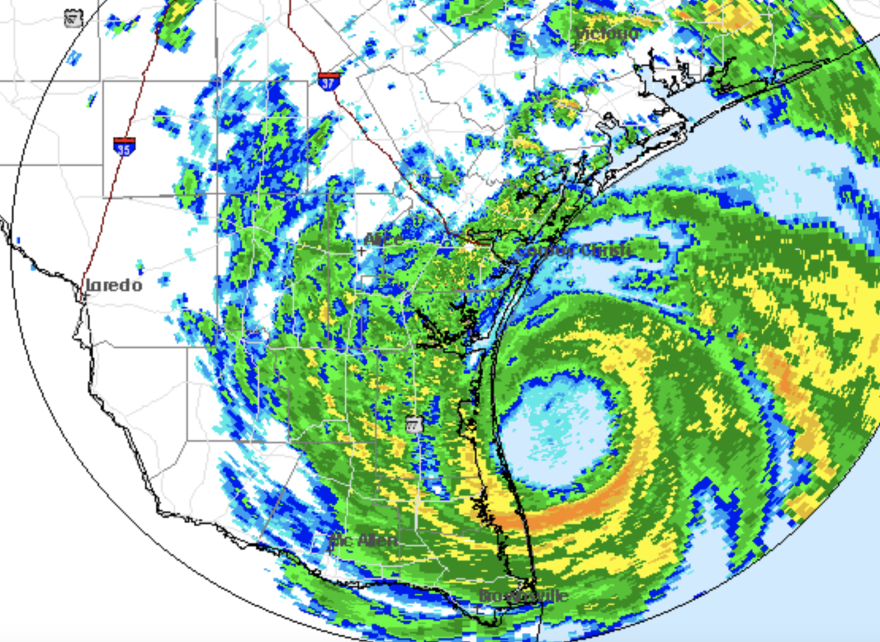As Hurricane Hanna closed in on the Texas coast, Gov. Greg Abbott called for residents not to forget the already existing threat of COVID-19.
“Any hurricane is an enormous challenge,” Abbott said in a news conference on Saturday afternoon. “This challenge is complicated and made even more severe seeing that it is sweeping through an area that is the most challenged area in the state for COVID-19.”
Hanna, the first hurricane of the season, is projected to directly impact a wide area of the Texas coast near Corpus Christi. Parts of the Rio Grande Valley are also expected to experience flooding. According to the National Weather Service in Corpus Christi, the hurricane should make landfall by early evening on Saturday, near Baffin Bay.
Abbott announced that the emergency response will include 17 COVID-19 mobile testing teams focused on shelters and 100 medical personal provided by the Texas National Guard. For people that leave the area, the American Red Cross will be providing hotel vouchers in San Antonio’s Freeman Coliseum. The governor also issued a disaster declaration for 32 counties and a federal emergency disaster declaration request.
“We will be responding in the way that we typically respond to hurricanes, but on top of that we will respond to the COVID challenges,” Abbott said.
One of those challenges could be how to handle an emergency in COVID-19 hot spots, such as nursing homes.
“We worked very close with all of the nursing homes through the testing and the cleaning. We know exactly where they are, how many residents they have,” said Texas Division of Emergency Management Chief W. Nim Kidd. “If we need to evacuate a nursing home at this point, we still have all the resources that we've had in every hurricane season to do that. The difference will be that we will be wearing more P.P.E. than we’ve had in the past.”
The National Hurricane Center previously issued a hurricane warning for a section of the Texas coast from Port Mansfield to Mesquite Bay — an area that includes Corpus Christi Bay, Aransas Bay and Padre Island.
The agency also issued a warning of storm surge for a wider area, including the coast from Port Mansfield to Sargent. Looking to assist, Abbott had already dispatched emergency resources to the Coastal Bend region and to the Rio Grande Valley, where the governor is simultaneously sending more than 1,000 medical personnel to help fight the novel coronavirus, which has devastated South Texas.
4 PM Hurricane #Hanna Update:
— NWS Corpus Christi (@NWSCorpus) July 25, 2020
- Hanna is moving west-southwest at 8 mph and is expected to make landfall by this early evening
- Hurricane, Storm Surge & Tropical Storm Warnings are in effect
- Flash Flood Watch in effect, 5-10" w/ isolated up to 15" possible#txwx #stxwx pic.twitter.com/dV19pZRqa5
Corpus Christi had already decided to closed a drive-thru coronavirus testing site until at least Tuesday.
“Don’t forget to know,” said Corpus Christi Mayor Joe McComb, “we’re also fighting the coronavirus.”
It was a stark reminder for a region that has been a coronavirus hot spot, adding well over 2,000 COVID-19 cases during each of the first two weeks of July. At least 2% of the population was infected, or one in every 50 people. Now the region is preparing for a storm in the middle of a pandemic.
The virus wasn’t always spreading so rapidly in Nueces County, which reported fewer than 100 cases and three deaths before Texas’ stay-at-home order expired April 30. But people spent the summer gathering at beaches and restaurants in the popular beachfront community, and now the county has seen a spike in cases.
Just last Friday, Nueces County Medical Examiner Adel Shaker was shocked to learn that a baby boy, less than 6 months old, had tested positive for COVID-19, the disease caused by the new coronavirus, and died shortly after that.
Storms are nothing new for the Coastal Bend region. McComb said some have helped the community grow closer. Nueces County Judge Barbara Canales agreed and said the region is ready for this storm.
“I join Mayor McComb in saying there is no doubt that we have a tremendous experience when it comes to these kinds of storms,” Canales said. “Where coronavirus may have caught us off guard, a hurricane does not. We know what to do. We know how to help.”
McComb underscored the reality of the coronavirus when warning residents who live in flood-prone neighborhoods about the prospect of evacuation.
“Take several masks with you because you might be there a couple days if you're in a flood area,” McComb said. “We don’t want to expose anyone during this storm. … Even when you’re in the house, I recommend wearing a mask if you're in crowded conditions.”
Correction: Due to editing errors, the name of the tropical storm was misspelled in an earlier version of this story, and the name of the National Hurricane Center was misstated.
This article originally appeared in The Texas Tribune at www.texastribune.org.

